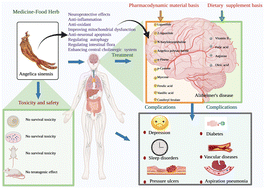Medicine–food herb: Angelica sinensis, a potential therapeutic hope for Alzheimer's disease and related complications
Abstract
Alzheimer's disease (AD) is a progressive neurodegenerative disease, which has brought a huge burden to the world. The current therapeutic approach of one-molecule-one-target strategy fails to address the issues of AD because of multiple pathological features of AD. Traditionally, the herb of Angelica sinensis (AS) comes from the root of an umbrella plant Angelica sinensis (Oliv.) Diels. As a typical medicine–food herb, studies have shown that AS can alleviate AD and AD-complications by multiple targets through the various foundations of pharmaceutical material and dietary supply basis. Therefore, this review summarizes the pharmacological effects of AS for the treatment of AD and AD-complications for the first time. AS contains many effective components, such as ligustilide, z-ligustilide, n-butylidenephthalide, α-pinene, p-cymene, myrcene, ferulic acid, vanillic acid and coniferyl ferulate. It is found that AS, AS-active compounds and AS-compound recipes mainly treat AD through neuroprotective, anti-inflammation, and anti-oxidant effects, improving mitochondrial dysfunction, anti-neuronal apoptosis, regulating autophagy, regulating intestinal flora and enhancing the central cholinergic system, which shows the multi-component and multi-target effect of AS. The role of dietary supplement components in AS for AD intervention is summarized, including vitamin B12, folic acid, arginine, and oleic acid, which can improve the symptoms of AD. Besides, this review focuses on the safety and toxicity evaluation of AS, which provides a basis for its application. This review will provide further support for the research on AD and the application of medicine–food herb AS in a healthy lifestyle in the future.

- This article is part of the themed collection: Food & Function Review Articles 2022


 Please wait while we load your content...
Please wait while we load your content...